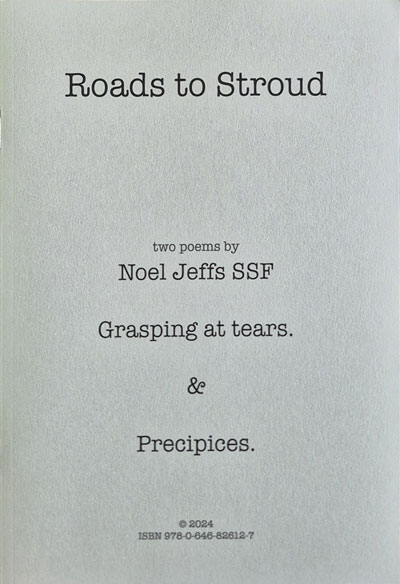 Reviewed by Jennifer Maiden
Reviewed by Jennifer Maiden
Roads to Stroud
by Noel Jeffs
Noel Jeffs’ 2024 collection Roads to Stroud comprises two long poems, “grasping at tears” and “Precipices”. In the context of religious poetry one assumes the process initiated is by the Divine, in the form of nature’s physical manifestations, and by the poet, in the form of the poem. Both these poems seem to revere that dual genesis, but the first concentrates on establishing the balance between the fecund imagination-potentiating silence and isolation in the home and the radiant natural details outside it. The second poem relaxes into these rough-edged external natural details in the form of a journey northward (and therefore on the map upward) in which the poet continues to communicate a sense of existential difficulty and occasional hard-won ease. One assumes the overall title infers the importance of the quiet country town as both a symbolic destination and a non-threatening but deathlike apotheosis.
If the above paragraph is accurate, the process of the text is more important than the individual items observed, but there are moments of striking description in which the process itself vivifies the observation:
a lump of isolation
trees walk boldly wildly grafting
or
I thought that we were there before,
and it is coming slowly.
The travelling waters are so elegant
the banks of those sand tilt scars, so tall
I am not a water bird anymore now, though
I once struggled and did feel the undertow
There is throughout these poems that expected tension in religious verse: who is the ideal reader? If it is God, the words are meant to mirror back in human art an essence already shared and known, but to supplicate to the Divine by means of praise that is still revelatory in its unexpected perceptions. There are also temporary areas of mutual mystery between Man and God that the poems themselves, as divine artifacts as well as human supplications, try to yield to the poet’s understanding. And, before that, there is the sense that words are pre-provided tools, useful and exciting but difficult to master for the task, and involving some adaption of them to accomplish it. From this perspective, there seems no doubt that the poet has given his full commitment.
If the ideal reader is a human, the description of spiritual processes has a different effect, as the observer is necessarily positioned outside the narrative and will relate to it through style and imagery. As with previous poems I have read by Jeffs, there is a sense of quickened pace created by the lack of formal scene-setting and there is a direct apprehension of feelings and objects. The poet’s persona is established sympathetically so that the reader wishes him well and hopes that his difficulties, whether physical or metaphysical, are resolved. This is reinforced by the poet’s frequent return to narrative points where his problems are comforted by contemplative richness and stillness. There are personal idiosyncrasies, such as distaste for the internet, that come and go and reinforce the book’s autobiographical boundaries.
What remains with this reader most about the book is the sense of that gritty juxtaposition of natural objects with the poet’s need for them to be revelatory in metaphysical terms, and the interesting extent to which in the book they become so.
Copies of the poems are available from Noel Jeffs for AUD 20 (20 Australian dollars) by emailing him directly.
About the reviewer: Jennifer Maiden is an Australian poet, novelist and essayist, with thirty-eight books (twenty-nine collections of poetry, three non-fiction works and six novels). She has also been Writer in Residence at STARTTS (NSW Service for the Treatment and Rehabilitation of Torture and Trauma Survivors), at universities and educational institutions, lectured at universities, and has also conducted over a thousand community literary workshops.
She has won many of Australia’s most prestigious awards including The ALS Gold Medal (2015), Victorian Prize for Literature (2014), The FAW Christopher Brennan Award, Three Kenneth Slessor Prizes for Poetry, Two C. J. Dennis Prizes for Poetry, The Melbourne Age Book of the Year, and The Harri Jones Memorial Prize to name just a few.